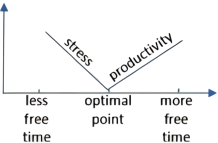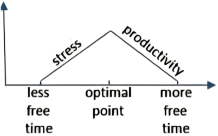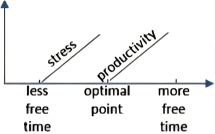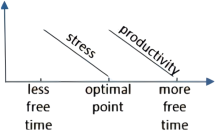1 . Quick Tips for Better Time Management
Are you a good time manager? If your answer is “no”, here are some tips on how to be a better time manager:
•Create a daily plan. Plan your day before it starts. The plan gives you a good description of how the day will go on. That way, you will be ready to deal with most of the things you meet.
•Focus. Are you multitasking so much that you’re just not getting anything done?
•Stay away from your time wasters. What takes your time away from your work? WeChat talking? Email checking?
•
•Decide to be early. When you prepare to be on time, you’ll either be on time or late.
| A.Learn to say “No”. |
| B.It is really a waste of time. |
| C.Stop checking them so often. |
| D.Most of the time you’ll be late. |
| E.Great ways to know your time spent. |
| F.If so, focus on just one key task at one time. |
| G.Your job for the day is to follow the plan as best as possible. |
| A.At 6:30. | B.At 7:30. | C.At 8:00. |
3 . For many high school students, it seems that there is never enough time. There are several steps you can take to organize your time better.
Make a to-do list every day. It makes it easy to plan any activities or meetings you may have in addition to homework. Be sure to set priorities (优先事项).
Use spare time wisely. Instead of wasting your spare time, read a book or do homework.
Decide on the time that is good for you to do certain things. If you are more of a morning person, try getting up an hour earlier and do schoolwork before school.
Review your notes every day.
Tell your friends and family about your work timetable. Explain that you will be working at certain times and ask them not to disturb you.
| A.Set goals for yourself. |
| B.Get a good night’s sleep. |
| C.Do the most important tasks first. |
| D.And also, do not be afraid to say “no”. |
| E.You should finish your task on time. |
| F.Don’t take phone calls during the time you set aside for work. |
| G.Don’t wait until just before a test to try and remember everything. |
| A.On January 16th. | B.On January 26th. | C.On January 27th. |
5 . Time is precious for students especially during finals. Having good skills of time management becomes so important. But how can you manage your time?
Get some sleep.
When things get rough, sleep often gets cut out of your schedule. The lab report has to be done by tomorrow morning, so... no sleep tonight, right? Wrong.
Prioritize (划分优先顺序) often.
Keep a running list of the major tasks that you’re performing. Change it as often as necessary and refer to it when you feel worried about all the things you have to do.
You can’t do so many all at once.
Although you might try hard to plan every detail of your routine, sometimes things just happen. You might get sick or your roommate loses your keys. Set aside as much time as you can each day for emergencies. That way, you needn’t deal with the unexpected in a rush.
Schedule time to relax.
Finals can be surprisingly stressful, and you may not realize how much harm they do to you until they’re over. Workload can sometimes be unbearable. Schedule some free time to make you mentally recharged.
Ask for help when you need it.
Asking for help is pretty normal during learning. It’s rare to find a student who can make it through school life without any help.
| A.Get on well with roommates |
| B.Leave extra time, just in case |
| C.Thus, don’t hesitate to seek help when necessary |
| D.Feeling worried may help you accomplish nothing |
| E.If you feel depressed, focus on the one at the top of the list |
| F.Let your brain take a break so it can go back to work efficiently |
| G.Not getting enough sleep can actually cost you more time in the long run. |
6 . The brain function of very late risers and “morning larks(早睡早起的人)” during the hours of the working day is different, according to a study.
Researchers scanned the brains of night owls(夜猫子)with a bedtime of 02: 30 and awake time of 10: 15, along with early risers. The tests performed between 08 : 00 and 20 : 00 found night owls had less connectivity in brain areas linked to keeping consciousness. They were more likely to be scatterbrained and they also had slower reactions and increased sleepiness.
Scientists took 38 people who were either night owls or morning larks (people who went to bed just before 23 : 00 and woke at 06 : 30) and studied their brain function at rest. The volunteers then carried out a series of tasks at various times, from 08 : 00 to 20 : 00, and were asked to report on their levels of sleepiness.
Morning larks were least sleepy and had their fastest reaction time in the early morning tests. They were also found to perform significantly better at this time than night owls. In contrast, night owls were least sleepy and had their fastest reaction time at 20 : 00, although they did not do significantly better than the larks at this time.
The brain connectivity in the areas that predicted better performance and lower sleepiness was significantly higher in larks at all time points, suggesting connectivity in late risers is impaired(减弱的) throughout the whole working day, researchers said.
The lead researcher, Dr Elise Facer-Childs, of the University of Birmingham’s Centre for Human Brain Health, said the findings “could be partly driven by the fact that night owls tend to compromise throughout their lives.” He added, “Night owls during school have to get up earlier, then they go into work and they have to get up earlier, so they’re constantly in conflict.”
Therefore, Dr Facer Childs called for more researches to understand the effects of night owls performing on a work or school schedule to which they are not naturally suited.
1. Which of the following can replace the underlined word “scatterbrained” in Paragraph 2?| A.Unfocused. |
| B.Satisfied. |
| C.Recognized. |
| D.Discovered. |
| A.Morning larks were more tired in the morning. |
| B.Night owls were more active in the morning. |
| C.Morning larks perform better all day. |
| D.Night owls perform better all day. |
| A.The workings of their brain. |
| B.The effects of their compromises. |
| C.Whether they can turn into morning larks. |
| D.How to help them adapt to the normal schedule. |
| A.To solve a problem. |
| B.To give practical advice. |
| C.To tell an interesting story. |
| D.To present a research result. |
1. What did the man do yesterday?
| A.He attended a business meeting. | B.He went on a trip. | C.He took an exam. |
| A.At 11:00 p.m. | B.At 10:00 p.m. | C.At 9:00 p.m. |
8 . Calendars are for managing your time. They work overtime to keep the messiness of human life confined into neat little grids, squeezing our lives into seconds, minutes and hours. I appreciate a calendar’s determined efforts to manage time.
You start by creating a wish list for your ideal life. The idea is to be as specific as possible. You then pick the one goal that would have the biggest positive impact. You break that goal down into smaller tasks, and then prioritize them.
Planning helps me ensure that I’m not a passenger at the mercy of my calendar, but rather driving toward a destination that I choose.
| A.Then, add those tasks to the calendar. |
| B.There’s no pressure to make it perfect. |
| C.But planners are for dreaming without limits. |
| D.It’s easy to appreciate calendars for their usefulness. |
| E.Using a paper planner brings me both joy and a sense of calm. |
| F.It’s an important ritual (仪式) that deserves weight and ceremony. |
| G.After all, our lives are the sum of how we spend our time and what we pay attention to. |
It was a cold winter Monday morning. Manu an eight-year-old was sleeping comfortably in his bedroom upstairs, at the Khagal house. Mondays are usually very difficult for him after a weekend break from his school. “Manu, wake up! It’s school time!” shouted out Manu’s mother Akhila, from the kitchen. Manu pulled the blanket over him and ignored his mother’s repeated attempts to wake him up. “Manu! It’s already 6 o’clock and your school bus will be here by 7. So please wake up and get ready. Manu continued sleeping.
Finally, after much pestering and pampering (纠缠和纵容), Manu got out of bed and started getting ready for school lazily. The school bus was already honking (按喇叭) in front of his house while Manu was brushing his teeth. Akhila requested the driver to wait for a few minutes. She quickly helped Manu get ready and helped him get to his school bus.
“Phew! Manu didn’t miss his bus today” Akhila sighed. She was really concerned about her son. Manu couldn’t do anything on time, waking up in the morning or any of his daily tasks. Akhila thought to herself “need to work out a plan to teach him a lesson in self-discipline (自律). Repeated advice and warnings haven’t changed him.”
The next day it was the usual scene at the Khagal house except that there was no effort from Akhila to wake up her son. The time was 7. The school bus honked and Akhila, unlike her usual self, asked the bus driver to leave. There was unusual confidence on Akhila’s face. Manu finally woke up at around 9 o’ clock. He ran down to the kitchen and cried out “Mom! Why didn’t you wake me up? The school bus has already left and I am really late for school today.” He couldn’t stop crying. “I have a math test today and Mrs. Mangat will punish me if I miss her class and the test.” The calm face of Akhila made Manu feel more anxious.
注意:1.续写词数应为150左右;
2.请按如下格式在相应位置作答。
“Mom, what should I do now? Please help!” said Manu weepingly.
________________________________________________________________________________________________________________________________________________________________________________________________________________________________________________________________________________________________________________________________________________________________________________________________________________________________________________________________________________________________________________________________________________________________________The scene the next day at the Khagal house was a little different.
________________________________________________________________________________________________________________________________________________________________________________________________________________________________________________________________________________________________________________________________________________________________________________________________________________________________________________________________________________________________________________________________________________________________________10 . Up and down the economic ladder, many Americans who work—and especially those raising kids—are pressed for time, wishing they had more of it to devote to leisure activities (or even just sleeping). At the same time, research has indicated that people who are busy tend to be happier than those who are idle, whether their busyness is purposeful or not.
A research paper released late last year investigated this trade-off, attempting to pinpoint (精确指出) how much leisure time is best. Its authors examined the relationship between the amount of “discretionary time” people had—basically, how much time people spend awake and doing what they want—and how pleased they were with their lives.
The paper, which analyzed data covering about 35,000 Americans, found that employed people’s ratings of their satisfaction with life peaked when they had in the neighborhood of two and a half hours of free time a day. For people who didn’t work, the optimal (最佳) amount was four hours and 45 minutes.
The research traced a correlation (关联) between free time and life satisfaction, but didn’t provide any definitive (最后的) insight into what underlies that correlation—“which is exciting, because this is a work in progress,” says Cassie Mogilner Holmes, a professor at UCLA’s Anderson School of Management and a co-author of the paper, which hasn’t yet been peer-reviewed or published in an academic journal.
An experiment that the researchers arranged hinted at (暗示) a possible explanation of the correlation they found. They asked participants to picture and describe what it would be like to have a certain amount of daily free time, and then report how they’d feel about that allotment (分配). “What we find is that having too little time makes people feel stressed, and maybe that’s obvious,” says Holmes. “But interestingly, that effect goes away—the role of stress goes away—once you approach the optimal point.” After that point, Holmes says, the subjects started to say they felt less productive overall, which could explain why having a lot of free time can feel like having too much free time.
It’s not clear what an individual is to do with these findings, since the amount of free time people have usually has something to do with a variety of factors, such as having children or a degree of control over work schedules. Holmes shared her research with the MBA students in her class on happiness, and some of the most time-crunched among them were comforted by the findings: “I think that two and a half hours creates a nice goal that even if you increase a little bit more of your discretionary time use, you can expect that it will translate into greater life satisfaction.”
1. According to the passage, what happens to Americans occupied with their work?| A.They allow themselves more leisure time. |
| B.They keep themselves busy on purpose. |
| C.They know how much leisure time is best. |
| D.They experience higher level of satisfaction. |
| A.Researchers have cast light on the cause of the correlation. |
| B.Unemployed people need more leisure time to feel content. |
| C.The paper on the correlation has achieved peer recognition. |
| D.Employed people enjoy more leisure time in the neighborhood. |
A. | B. |
C. | D. |
| A.Holmes is optimistic about the influence of her findings |
| B.individuals are encouraged to control their work schedules |
| C.people with tight schedules can’t benefit from the findings |
| D.the MBA students find no free time to obtain life satisfaction |



